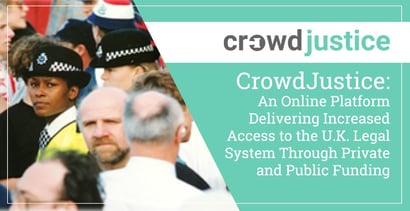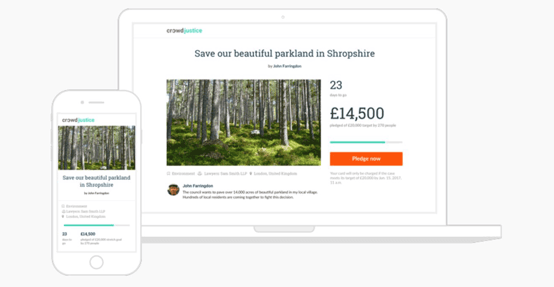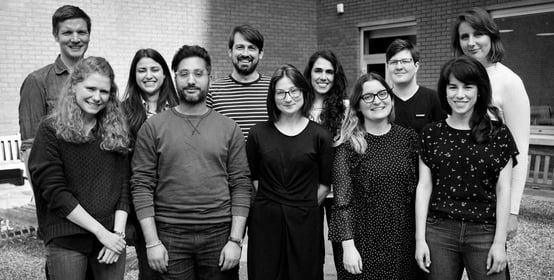

In a Nutshell: Access to justice is essential to the rule of law, yet individuals across the world fail to gain access to the legal services they need. CrowdJustice is an online platform in the U.K. that helps individuals and lawyers raise funds for their legal challenges. The platform is similar to other crowdfunding initiatives except it deals exclusively with legal cases. Users can gain more visibility for their cases and secure funds to help them pay for legal fees they would not otherwise be able to cover. CrowdJustice has facilitated funding for all sizes of cases in areas including criminal justice, immigration law, environmental law, and employment law.
Legal cases can be exorbitantly expensive, but the rule of law is at its best when everyone has the chance to be an equal participant.
“In the absence of access to justice, people are unable to have their voice heard, exercise their rights, challenge discrimination or hold decision-makers accountable,” according to the United Nations.
In other words — it’s extremely important.
Yet, in developed countries across the world, people still fall through the cracks, and societies struggle to provide appropriate access to justice for individuals.
 One company in the United Kingdom is addressing this crucial issue by bringing crowdfunding to the legal system. CrowdJustice was founded in 2015 by former United Nations lawyer Julia Salasky with the mission to broaden access to justice for citizens in the U.K.
One company in the United Kingdom is addressing this crucial issue by bringing crowdfunding to the legal system. CrowdJustice was founded in 2015 by former United Nations lawyer Julia Salasky with the mission to broaden access to justice for citizens in the U.K.
“We’re a team of lawyers, technologists, and campaigners and we built CrowdJustice as a way to level the playing field,” according to the company website.
Salasky began her legal career as a commercial litigator in London, said CrowdJustice Head of Campaigns Matthew Bethell. She also did a lot of pro bono work with the U.K.’s Legal Aid Center, which provides legal services to individuals who can’t afford representation.
Then, as a lawyer for the United Nations, Salasky worked on projects that leveraged online technology to give consumers better access to justice, Bethell said.
“Those two experiences sort of led her to make this connection that technology and the social aspect of the internet had the potential to really transform the legal system — in particular by improving access to justice,” Bethell said.
How CrowdJustice Facilitates Donations to Pay for Legal Services for Individuals and Groups
“We know that it’s a real challenge to find the necessary funds to bring legal action in lots of instances. That’s why large companies and wealthy individuals are able to deploy the law to their benefit quite often,” Bethell said. “Most individuals don’t have that strength in terms of financial backing.”
He said CrowdJustice seeks to level the playing field by allowing anybody who has instructed a lawyer or is working with a registered organization — such as a charity — to create a webpage for his or her case.

Matthew Bethell is the Head of Campaigns for the CrowdJustice platform.
U.K. residents who need to fund a legal case can create an account then select whether they want their case to be shared publicly or if it is only to be shared privately with specific individuals.
Next, individuals build their case page with guidance and tools from CrowdJustice.
“We try to provide as much support as we can to help people present their case as clearly as possible, and hopefully get other people to care about it,” Bethell said. “That’s the objective — present the case, promote it to as many people as possible so that people land on the page, click through, contribute, and then, most importantly, share.”
In addition to helping users construct their pages and present their cases, CrowdJustice provides access to a range of other tools, including email templates, social media guides, a dashboard, and statistics and analytics.
“We know that people are going through all sorts of things when they take up a legal challenge,” he said. “It can be a very isolating and difficult thing for people to go through.”
Once a case has reached its initial funding goal, the funds are released directly to the client’s lawyer.
One of the important things that distinguishes CrowdJustice from other crowdfunding platforms is that it is specifically for legal cases, Bethell said. A person cannot create a page unless they have instructed a lawyer for the case.
And Bethell said CrowdJustice’s anti-money laundering and security checks meet or exceed those of law firms, so contributors can feel confident that their funds are going directly to support the case.
Campaigns usually take about two weeks to hit their funding target, and 4 out of 5 campaigns are funded, according to CrowdJustice.
Lawyers Can Take On Cases and Clients That May Not Be Possible Otherwise
CrowdJustice is structured so lawyers can use the platform for crowdfunding as well.
“From a few hundred pounds to hundreds of thousands, secure funds at any stage of the legal process for a wide range of practice areas,” according to the CrowdJustice website.
Similar to individual users, lawyers can create a free account to access resources, which are tailored to specific practice areas.
“CrowdJustice provides a quick, proven way for your clients to pay for your work,” according to the website.

CrowdJustice provides a handy dashboard and other tools for both lawyers and individuals to easily navigate within the platform.
The company offers A Lawyer’s Guide to Crowdfunding for download on its website to help lawyers understand how crowdfunding can help raise funds for their clients. The guide addresses any ethical concerns lawyers may have and displays examples of cases that have successfully been funded in the past.
“Using CrowdJustice doesn’t change the relationship between you and your client. Your client remains responsible for all legal fees,” according to the guide. “Once your client hits their target, funds raised are transferred to your client account.”
Lawyers will also be notified when their clients hit key funding targets, which typically takes a few days, according to the company.
“Fundraising targets should be tailored to the objectives of each case. In some cases, a small amount may be highly impactful to defray out-of-pocket costs or expert witness fees related to the case; other cases may require more extensive funding resources,” according to the guide.
The CrowdJustice support team will help lawyers and their clients evaluate the appropriate fundraising objectives for each case.
Once a campaign is successfully funded, about 94% of the total funds raised on CrowdJustice go directly to the client’s trust account. CrowdJustice charges a 3% platform fee, with the remainder of funds covering payment processor and compliance fees. If campaigns do not hit their target funding goals, cards are not charged, and no fees are collected, according to the company.
Handling an Array of Cases, Both Big and Small, Across a Variety of Legal Fields
“The legal sector, generally, is not the quickest to take up new technology. It takes a while for these things to embed, particularly here in the U.K.,” Bethell said. “But when they do pick it up, they really see the positive impact of it.”
CrowdJustice has worked with hundreds of law firms and raised more than 10 million pounds for legal cases since its launch, he said.
“It’s about the money, obviously, but it’s also about building communities around these issues. To be honest, that’s the most empowering and interesting thing in some respects,” Bethell said. “When you’re going through a legal challenge, you can feel on your own, but in most instances, you’re not on your own.”
He said thanks to CrowdJustice’s visibility, users discover others who have been through similar challenges.

Julia Salasky, pictured at center alongside the CrowdJustice team, is the Founder and CEO of the legal crowdfunding platform.
“We’ve had multiple cases where people will say they were surprised that so many other people cared,” he said. “These cases can go on for a long time, and having a team behind you is a really positive thing.”
Bethell emphasized the diversity of cases that are able to be funded on CrowdJustice. He said some people don’t think their case would be in an area that would be funded, or may not be high-profile enough for people to care about.
“What we find is that everything from immigration cases, to employment cases, or disability rights — these areas that aren’t necessarily the really high-profile cases — can actually be successful as well,” he said.
CrowdJustice has facilitated funding for more than 500 campaigns. In addition to the fields listed above, successfully funded campaigns have involved government and civil liberties cases, environmental issues, and criminal justice cases.
With its user-friendly interface and proven results, CrowdJustice is fulfilling its mission on a daily basis to deliver greater access to justice to U.K. residents.
Advertiser Disclosure
BadCredit.org is a free online resource that offers valuable content and comparison services to users. To keep this resource 100% free for users, we receive advertising compensation from the financial products listed on this page. Along with key review factors, this compensation may impact how and where products appear on the page (including, for example, the order in which they appear). BadCredit.org does not include listings for all financial products.
Our Editorial Review Policy
Our site is committed to publishing independent, accurate content guided by strict editorial guidelines. Before articles and reviews are published on our site, they undergo a thorough review process performed by a team of independent editors and subject-matter experts to ensure the content’s accuracy, timeliness, and impartiality. Our editorial team is separate and independent of our site’s advertisers, and the opinions they express on our site are their own. To read more about our team members and their editorial backgrounds, please visit our site’s About page.
